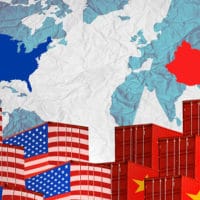-
Disruption in the world of trade
What is noteworthy is that the deceleration in import volume growth has been particularly marked in the emerging economies of Asia and Latin America, pointing to a loss of momentum in the countries that were expected to be new growth poles in the immediate aftermath of the 2007 crisis.
-
Vanishing green shoots and the possibility of another crisis
Governments and central banks that were upbeat about global economic recovery are turning pessimistic. A coordinated fiscal stimulus across nations is the need of hour.
-
Foreign Banks or Foreign Capital?
One less emphasised lesson from the global financial crisis was that developing countries that are successful in attracting foreign financial investors take a hit when such a crisis occurs because of a reverse flow of capital. Foreign financial firms needing to cover losses or meet commitments at home withdraw their capital, generating a credit crunch […]
-
Trading Growth for Inflation
Earlier this month all eyes were on Reserve Bank Governor Duvvuri Subbarao. Every statement of his was read as signalling whether he would raise interest rates and by how much he would do so this time. With the economy having bounced back and GDP growth approaching previous peaks, the presumption was that the focus of […]
-
Public Works and Wages in Rural India
The “small round” surveys of the NSSO are usually not considered to be so good at capturing trends, because their smaller size makes them non-comparable with the quinquennial large surveys. However, the 64th Round was a much larger survey than normal (with a sample of 1,25,578 households: 79,091 in rural areas and 46,487 in urban […]
-
India: Growth for Whom?
The year 2010 would be remembered as a scam-tainted year when allegations of corruption, both public and private, were difficult to keep track of. Overwhelmed by these allegations, the government has attempted to focus on the fact that India is among the fastest growing countries in the world. But even that boastful claim has been […]
-
Playing the Currency Blame Game
The slanging match over currency and monetary policies at the annual Fund-Bank meetings, held over the second weekend of October, points to the disarray in global economic governance. While the US sought to mobilise IMF support for an effort to realign exchange rates and ensure an appreciation of the renminbi in the wake of China’s […]
-
The New Mercantilists
For several centuries — between the 15th and the early 19th centuries — mercantilist theories dominated the attitude to trade in Europe. This was the belief that an economy that had positive net exports (through exports being greater than imports) would be wealthier because it would lead to an inflow of bullion, or assets, and […]
-
Indian IT: Privileged, Protected and Pampered
India’s IT industry does protest too much. Its latest peeve is that the US has decided to steeply hike, from $2300 to about $4300, the cost of a H-1B visa required for entry into the US of temporary skilled workers from abroad. The new Border Security Bill passed by the US Senate and signed into […]
-
G20: Where No Side Wins
There is only one message that comes out of Toronto, where the G20 summit has come to an end. The formation, ostensibly created to reflect changing power equations in the world economy, serves no purpose. It has turned out to be one more talking shop in which agreement to disagree is presented as a consensus. […]
-
The Spectre of Public Debt
Pegging their arguments on the still ongoing drama relating to sovereign debt in Greece, conservative opinion is making a case for a reduction of the size of public debt in developed and developing countries across the world. The latest signatory to the appeal is IMF chief Dominique Strauss-Kahn who reportedly told an audience at the […]
-
Recovery or Bubble?
Fears of a new speculative boom on which the global recovery rides are being expressed in different circles. There are as many aspects to these fears as there are to the so-called recovery, which include the huge profits being recorded by some major banking firms, the surge in capital flows to emerging markets, the speculative […]
-
On the Dollar’s Decline
If time lags matter, news of the dollar’s demise as the world’s principal reserve currency is grossly exaggerated. That prediction has been periodically heard at least since the early 1970s when the United States brought the Bretton Woods arrangement to an end by breaking the link between dollar and gold. As is obvious, whatever else […]


